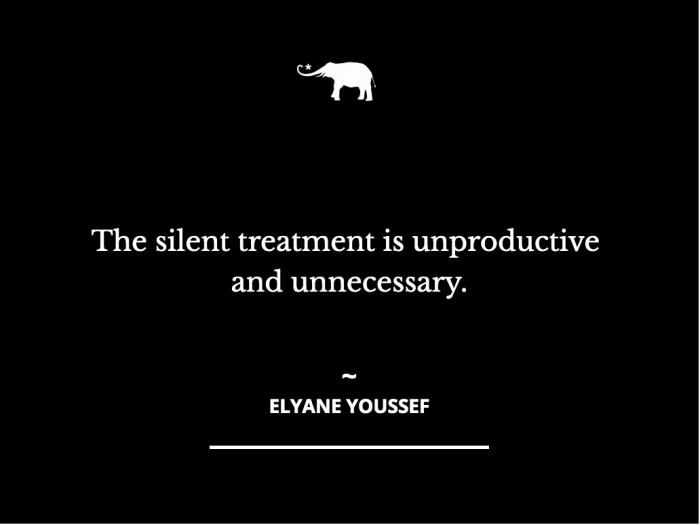View this post on Instagram
I hate to admit it, but I used to be an expert at giving the silent treatment in my past relationships.
I lost count of how many “I’m okay” I had uttered. It didn’t matter how many times my partner asked if there was something wrong—I would still be “okay.”
I also hate to admit it, but I was never okay. Silence and slow withdrawal were my quick responses to any kind of conflict. The ironic thing was that I firmly believed it was a “healthy” way to approach situations like this. Little did I know, when I used this approach, how much pain and damage I was inflicting on my partner and the relationship. In addition, my silence was never powerful—it was manipulative.
When I began experiencing the benefits of open and honest communication, I realized that the silent treatment is a toxic and vicious cycle. The one giving the silent treatment becomes distant and slowly builds up anger within, whereas the partner receiving it becomes frustrated and pushy.
Sometimes we give our partner the silent treatment unconsciously; other times we do it on purpose. Either way, we might use this tactic for many possible reasons.
Some of them are:
>> We think the issue at hand is not worth discussing
>> We don’t know how to handle conflicts
>> We think our partner will instinctively know why we’re not okay
>> We think our silence will make our partner submissive
>> We want to punish our partner and make them feel bad
>> We’re scared of our partner’s reaction if we open up
>> We want to avoid responsibility or admit our wrongdoing
Regardless of what triggers the silent treatment, giving our partner the cold shoulder for days (or even weeks) is harmful to everyone involved. Without proper communication, conflicts can never be resolved.
If we don’t feel like talking, we can gently ask for space and postpone the conversation. But refusing to talk is destructive and wreaks havoc on our relationships. If the verbal aspect is lost, intimacy and comfort are lost too.
If you’re the one giving the silent treatment, here are a few ways to ditch the toxic habit of withdrawal:
- If you’re being silent to exert control or power over your partner, know that you’re not controlling them—you’re only hurting the relationship and possibly creating inevitable future conflicts.
- Punishment is a form of emotional abuse. In healthy relationships, partners don’t punish each other—they work together.
- If you don’t know how to express your needs or feelings, be honest about it. Tell your partner that you’re upset but have no idea how to communicate it. In a healthy relationship, partners help and inspire each other.
- Every single issue—big or small—is worth discussing. The silent treatment doesn’t dissolve problems; it increases their intensity.
- Before saying “I’m okay,” think about all the reasons why you’re not okay and find an appropriate way to verbalize them.
- Your partner can’t read your mind, although I know you wish they can. So silence and frowns won’t give them hints. Talk. Talk. Talk.
If you’re the one receiving it, stay present and aware with your silent partner without becoming defensive. They might need space or time to talk, as not all of us are excellent communicators. Let them know that you acknowledge their current behavior and tell them how you feel about their withdrawal (sad, hurt, shocked, and so on).
If their behavior becomes abusive, remove yourself from the situation.
The silent treatment is unproductive and unnecessary. We can save ourselves time, effort, and pain if we delve into healthy conversations right away.
~
 Share on bsky
Share on bsky


Read 3 comments and reply